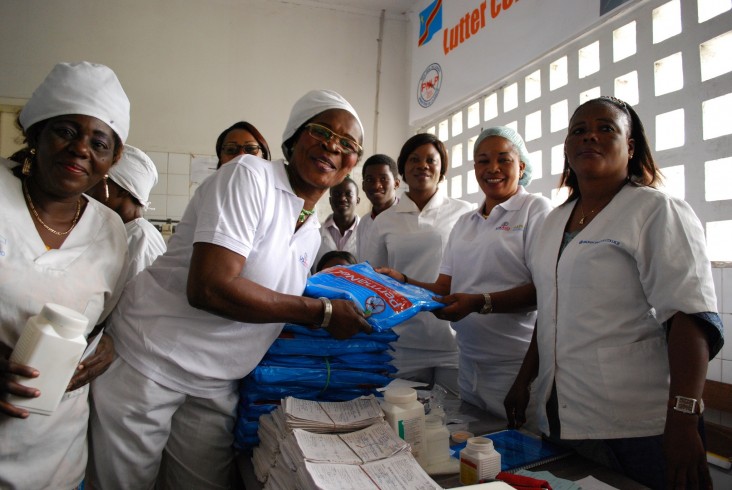
U.S. government releases tenth annual malaria report, showcasing a decade of progress, outlining challenges
For Immediate Release
KINSHASA - The U.S. President’s Malaria Initiative (PMI), led by the U.S. Agency for International Development (USAID) and implemented together with the Centers for Disease Control and Prevention (CDC), today released its tenth annual report, documenting progress across its programs including in the Democratic Republic of the Congo (DRC).
In collaboration with other donors, all Congolese, regardless of where they live, now have access to malaria prevention and treatment services. About 27 million Congolese, or 35 percent of the population of the DRC, receive essential malaria services thanks to the U.S. government.
Since 2007, the DRC has reduced all-cause mortality among children under the age of 5 by 30 percent as a direct result of collective investment and action by the government, communities, donors, and partners.
Malaria is a major killer of young children, and during pregnancy, malaria can pose a serious, life-threatening risk to a woman and her baby. The U.S. President’s Malaria Initiative works with the DRC’s national malaria control program to scale-up proven, cost-effective, and life-saving malaria control interventions, namely long-lasting insecticide-treated mosquito nets, indoor residual spraying with insecticides, intermittent preventive treatment for pregnant women, diagnostic testing, and highly effective malaria treatment.
President Bush created the Initiative in 2005 when the disease was almost certainly a death sentence for most poor children in Africa. And President Obama significantly expanded the initiative. Today, the U.S. President’s Malaria Initiative supports 19 countries in sub-Saharan Africa and the Greater Mekong sub-region.
Through the U.S. President’s Malaria Initiative, hundreds of millions of people have benefited from protective measures and have been diagnosed and treated for malaria. The Initiative has reached into the poorest of communities in sub-Saharan Africa, where malaria flourishes, arming women, children, and families with tools to protect themselves from malaria and providing them with fast-acting medicines to cure malaria if they do become sick.
These efforts have paid off. Working with host-country governments, donor governments, multilateral agencies, non-governmental organizations, and academic and research partners, more than six million deaths have been averted, and the vast majority of the lives saved have been children, according to the World Health Organization’s 2015 World Malaria Report. A number of PMI-focus countries have witnessed reductions in both death and illness from malaria, with some countries now setting their sights on eliminating malaria completely.
“The push to end malaria is saving millions of lives, increasing attendance at school, improving worker productivity and boosting local economies,” said U.S. Ambassador to the DRC James Swan.
“But we must do more to better protect expecting mothers and their newborns from malaria. Safe and effective treatment to prevent malaria in pregnancy is available during antenatal care, and sleeping under a long-lasting insecticide treated mosquito net is vital. Increasing access to health services -- especially for the poor – is a sound and sustainable investment that can command great economic returns,” Ambassador Swan said.
In just the past year, the U.S. President’s Malaria Initiative procured more than 42 million long-lasting insecticide-treated nets, 57 million antimalarial treatments, and more than 54 million rapid diagnostic tests worldwide. The Initiative is also helping train community health workers and medical personnel to care for people with malaria, and is helping governments take charge of malaria campaigns in their own countries. For example, this past year alone, the Initiative supported training for 77,000 health workers in malaria case management.
In the DRC, according to the 2013 Demographic and Health Survey, 60 percent of pregnant women and 56 percent of children under 5 years old slept under insecticide-treated bed nets, compared to just 7 percent and 6 percent respectively in 2007. The number of households with at least one mosquito net has increased from 9 percent in 2007 to 70 percent in 2013. A rapid expansion in diagnostic testing, and in the availability of antimalarial medicines, has allowed many more people to access timely and appropriate treatment. We are also strengthening key components of partner country health systems, including commodity supply chains, laboratories, and health information systems. The WHO World Malaria Report estimates that reductions in malaria cases in sub-Saharan Africa saved those countries an estimated US $900 million over 14 years.
While there is much progress to be celebrated in the fight against malaria, it continues to exact an unacceptable toll on the world’s most vulnerable populations. Despite the historic gains, we still have a long way to go. In 2015, there were 214 million new cases of malaria and 438,000 malaria-attributed deaths worldwide, with around 90 percent of these occurring in sub-Saharan Africa. The vast majority of these cases and deaths were among children under the age of 5. In Africa, a child dies every other minute because of the disease.
The U.S. Government, through the U.S. President’s Malaria Initiative, stands as a steadfast partner in the global fight against malaria, working together with host country governments and the broader malaria partnership to maintain the momentum for malaria elimination. The U.S. Government remains firmly dedicated to fighting malaria and saving lives with the DRC.
Related Press Releases
- 10,000 Community Health Volunteers Receive Equipment from USAID’s Community Capacity for Health Program
- Afghanistan Ministry of Public Health Launches First Data Warehouse for the Health Sector with help from USAID
- USAID and the National Center or Healthy Lifestyles Promotion Conduct Training for Journalists on Tuberculosis Reporting







Comment
Make a general inquiry or suggest an improvement.